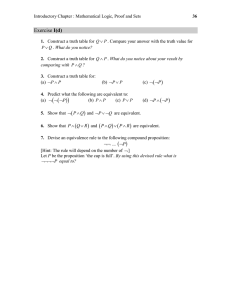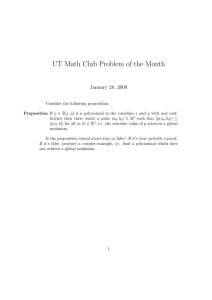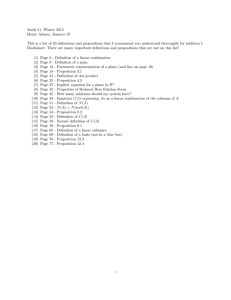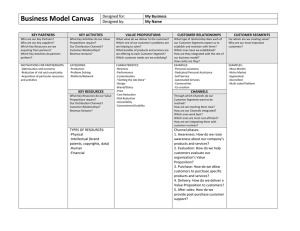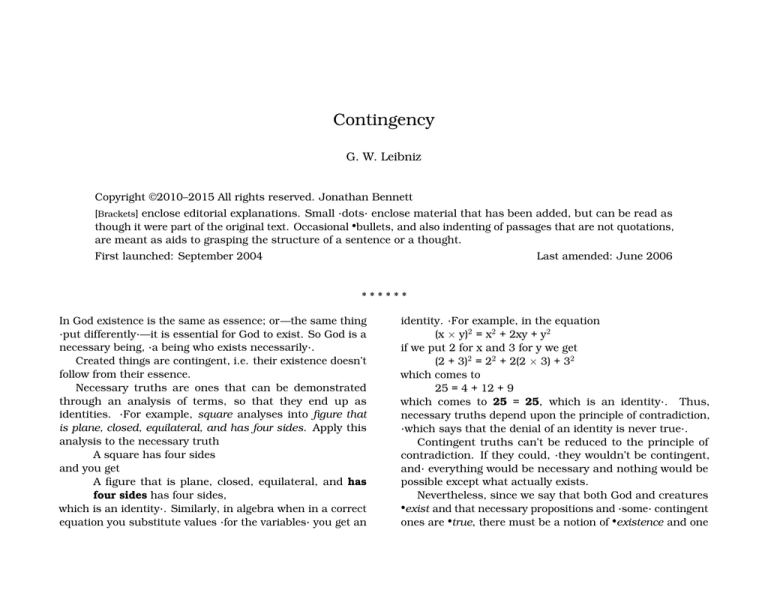
Contingency
G. W. Leibniz
Copyright ©2010–2015 All rights reserved. Jonathan Bennett
[Brackets] enclose editorial explanations. Small ·dots· enclose material that has been added, but can be read as
though it were part of the original text. Occasional •bullets, and also indenting of passages that are not quotations,
are meant as aids to grasping the structure of a sentence or a thought.
First launched: September 2004
Last amended: June 2006
******
In God existence is the same as essence; or—the same thing
·put differently·—it is essential for God to exist. So God is a
necessary being, ·a being who exists necessarily·.
Created things are contingent, i.e. their existence doesn’t
follow from their essence.
Necessary truths are ones that can be demonstrated
through an analysis of terms, so that they end up as
identities. ·For example, square analyses into figure that
is plane, closed, equilateral, and has four sides. Apply this
analysis to the necessary truth
A square has four sides
and you get
A figure that is plane, closed, equilateral, and has
four sides has four sides,
which is an identity·. Similarly, in algebra when in a correct
equation you substitute values ·for the variables· you get an
identity. ·For example, in the equation
(x × y)2 = x2 + 2xy + y2
if we put 2 for x and 3 for y we get
(2 + 3)2 = 22 + 2(2 × 3) + 32
which comes to
25 = 4 + 12 + 9
which comes to 25 = 25, which is an identity·. Thus,
necessary truths depend upon the principle of contradiction,
·which says that the denial of an identity is never true·.
Contingent truths can’t be reduced to the principle of
contradiction. If they could, ·they wouldn’t be contingent,
and· everything would be necessary and nothing would be
possible except what actually exists.
Nevertheless, since we say that both God and creatures
•exist and that necessary propositions and ·some· contingent
ones are •true, there must be a notion of •existence and one
Contingency
G. W. Leibniz
of •truth that can be applied both to what is contingent and
what is necessary.
What is common to every •truth, in my view, is that one
can always give a reason for a true proposition unless it is an
identity. In necessary propositions the reason necessitates,
whereas in contingent ones it inclines. ·Identical propositions· are, as I have said, the rock-bottom reasons for all
necessary truths; we don’t have reasons why they are true·.
And it seems to be common to things that •exist, whether
necessarily or contingently, that there is more reason for
their existing than there is for any others to exist in their
place.
Every true universal affirmative proposition, whether necessary or contingent, has some connection between subject
and predicate. In identities this connection is self-evident;
in other propositions it has to be brought out through the
analysis of terms.
This little-known fact reveals the distinction between
necessary and contingent truths. It is hard to grasp unless
one has some knowledge of mathematics, ·because it goes
like this·. When the analysis of a necessary proposition
is continued far enough it arrives at an identical equation;
that’s what it is to demonstrate a truth with geometrical
rigour. But the analysis of a contingent proposition continues to infinity, giving reasons (and reasons for the reasons
(and reasons for those reasons. . . )), so that one never has
a complete demonstration. There is always an underlying
·complete and final· reason for the truth of the proposition,
but only God completely grasps it, he being the only one
who can whip through the infinite series in one stroke of the
mind.
good example from geometry and numbers. In •necessary
propositions, ·as I have said·, a continual analysis of the
predicate and the subject can eventually get us to the point
where we can see that the notion of the predicate is in
the subject. For a •numerical analogue of this, consider
the process of getting an exact comparison between two
numbers: we repeatedly divide each until we arrive at a
common measure. For example, wanting to compare 24,219
with 12,558, we find that each can be divided by 3 then by 13
then by 23, giving us the more graspable relationship of 27
to 14. But that doesn’t work with an •incommensurable
pair
√
of numbers such as any whole number and 2: as Euclid
has clearly demonstrated, there is no fraction F such that
(F × F) = 2. We can work along a series of fractions, squaring
as we go, and get ever nearer to 2, but it is mathematically
impossible for us to end the series by finding a fraction
whose square exactly equals 2.
√ Still, there is a proportion or
relation between (say) 3 and 2; we can’t express it exactly
in terms of fractions, but we know that it exists:
√ 3 is a
certain determinate definite amount larger than 2. I offer
this as analogous to the situation with •contingent truths: in
them there is a connection between the terms—i.e. there is
truth—even if that truth can’t be reduced to the principle of
contradiction or necessity through an analysis into identities.
·Here are two questions that can be asked about the
necessity of certain propositions·. Is this proposition:
•God chooses the best
necessary? Or is it one—indeed, the first—of his free decrees?
Again, is this proposition:
•Whatever exists, there is a greater reason for it to
exist than for it not to exist
necessary? ·I answer that the •former proposition is not
necessary: God always chooses the best because he decrees
that that’s what he’ll do. It follows that the •latter proposition
[This paragraph expands Leibniz’s compact formulation in ways that
can’t be flagged by ·dots·. For more on ‘incommensurables’, see pages
4–5 of his Dialogue on human freedom.]
I can illustrate this with a
2
Contingency
G. W. Leibniz
Unless there were such a principle ·as this one about
reasons·, there would be no principle of truth in contingent
things, because to them the principle of contradiction is
certainly irrelevant.
Not all possibles come to exist—we have to accept that,
because if it were false you couldn’t think up any story that
wasn’t actually true somewhere at some time! Anyway, it
doesn’t seem possible for all possible things to exist, because
they would get in one another’s way. There are, in fact,
infinitely many series of possible things, no one of which
can be contained within any other, because each of them is
complete.
From the following two principles, the others follow:
(1) Whatever God does bears the mark of perfection or
wisdom.
(2) Not every possible thing comes to exist.
To these one can add:
(3) In every true universal affirmative proposition the
predicate is in the subject, i.e. there is a connection
between predicate and subject.
is not necessary either: there is always a greater reason for
the existence of an actual thing than for any possible rival to
it, but only because God has freely decided always to choose
the best·.
It is certain that there is a connection between subject
and predicate in every truth. So the truth of Adam, who sins,
exists requires that the possible notion of Adam, who sins
involves something by virtue of which he is said to exist.
It seems that we must concede that God always acts
wisely, i.e. in such a way that anyone who knew his reasons
would know and worship his supreme justice, goodness, and
wisdom. And it seems that God never acts in a certain way
just because it pleases him to act in this way, unless there
is a good reason why it is pleasing. ·Thus, something may
be done ‘at God’s pleasure’ (as we say), but that is never an
alternative to its being done for a reason·.
Since we can’t know the true formal reason for the
existence of any particular thing, because that would involve
an infinite series ·of reasons·, we have to settle for knowing
contingent truths a posteriori, i.e. through experience. But
we must at the same time hold the general principle, implanted by God in our minds and confirmed by both reason
and experience, that nothing happens without a reason, as
well as the principle of opposites, that ·of rival possibilities·
the one for which there is more reason always happens. (I
said ‘confirmed by experience’, but ·treat that cautiously. I
meant only that experience confirms the principle· to the
extent that we can discover reasons through experience.)
And just as God decreed that he would always act in
accordance with true reasons of wisdom, so too he created
rational creatures in such a way that they act in accordance
with prevailing or inclining reasons—reasons that are true
or, failing that, seem to them to be true.
[In this next paragraph, Leibniz wrote of a proposition’s existing, apparently meaning its being true.] Assuming that this proposition:
The proposition P that has the greater reason for being
true is true
is necessary, we must see whether it then follows that P
itself is necessary. It isn’t. If by definition a necessary
proposition is one whose truth can be demonstrated with
geometrical rigour, then indeed it could be the case that these
two propositions are demonstrable ·and thus necessary·:
•A proposition is true if and only if there is greater
reason for it to be true than for it to be false.
•God always acts with the highest wisdom.
But from these one can’t demonstrate any proposition of
the form Contingent proposition P has greater reason ·for
3
Contingency
G. W. Leibniz
being true than for being false· or of the form Contingent
proposition P is in conformity with divine wisdom. So it
doesn’t follow from the above two displayed propositions that
any contingent proposition P is necessary. Thus, although
one can concede that it is necessary for God to choose the
best, or that the best is necessary, it doesn’t follow that P
is necessary, where P is something that has been chosen;
for there is no demonstration that P is the best. This can be
put in terms of the ·technical· distinction between •necessity
of the consequence and •necessity of the consequent—that
is, between •P necessarily follows from Q and •P is itself
necessary. Assuming that the best is necessarily chosen, we
have
From P is the best it follows necessarily that P is true,
but we do not have
Necessarily P is true,
because we have no demonstration that P is the best.
·Though I have been exploring the implications of the
thesis that necessarily God always chooses the best, I don’t
assert it. I say only that· it seems safer to attribute to God
the most perfect way possible of operating. When it comes to
creatures, one can’t be as sure ·as we can with God· that they
will act in accordance with even the most obvious reason;
with respect to creatures, this proposition—·that they will
always so act·—can’t be demonstrated.
4

